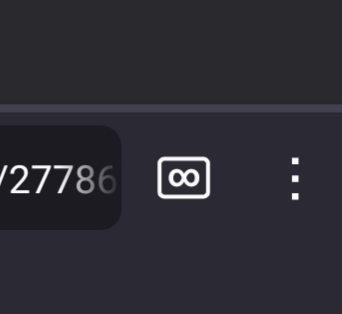Bro has an anime profile pic and acts like he doesnt already have the tail plug in smh
Not only that, but the character in that profile pic often sprouts cat ears when she has strong feelings.

Hating furries is stage 1 of becoming a furry.
I haven’t heard somebody use the word “murring” in like a decade. Methinks they’re farther down the pipeline than they want to admit.
- The Internet is full of old memes that slowly make their way around to different communities and this could be one of them.
- What in the world is “murring”? This is the first time I’ve ever heard of it.
murr is a reaction that furries (often ironically these days) give when something has sexual appeal… probably onomatopoeia for a purr, idk
of the same vintage as “owo what’s this”

Soon the world shall be furries. And finally there will be peace on earth.
amen.
(although reasonably i think you might have too much faith in us. a society wide desire to be a colorful dog has the power to accomplish a great many things but peace on earth is a tall order)
Removed by mod
Ew! A Furry! ⬆
Stage 7 is memorizing the Macarena.
Stage 19 is affecting a québécois accent
Stage 42 is hitchhiking
Ben non?!
Mais non!
what if you don’t hate furries but don’t want to be one?
then we’ll happily continue living our respective lives side by side, working together hand in paw for the greater good
I switched back to Firefox over a year ago and I have not noticed it using much less RAM than Chrome tbh. It’s definitely the better browser for all the other reasons, but I wouldn’t list memory utilization as a big advantage over other browsers
The whole RAM thing is way overblown. Both browsers request a lot of RAM allocation, but only actually use a fraction of it. When the OS needs it for another process this “allocated, but unused” pool is the first to get used when “Free and unallocated” is gone
Problem is windows reports it all as the same in the task manager so people see that “70%” usage and freak out.
Tl:Dr Windows task manager is a fuckin lier.
There’s also the idea that free RAM is somehow a good thing. In an ideal system, the RAM would always be “full” of potentially useful data. Having a bunch of empty RAM means that it’s not being useful. That space could be used to hold plenty of regularly used files that would be instantly loaded instead of having to pull from the drive again.
I don’t know when everyone started getting concerned with RAM usage, but in a perfect system, it would hold onto all of your frequently used programs and files that it could fit from boot and then those would load instantly.
Some Linux distros even allow loading the entire OS into RAM for wild speeds.
Idle RAM is just that. It does you no favors. Now, I do understand that you don’t want to be completely out, but we act like having 80% free is a goal for some reason.
The problem is that the extra RAM used by a browser is held on an exclusive basis and so is not nicely reclaimable by the kernel. I love that Linux caches the shit out of files in RAM, it’s great. It’s also great that it can release that memory when I launch a chundering dumpster fire application that eats all of my RAM. If a browser had been holding that memory, then the godawful Linux OOM killer would have launched, halted all threads on the system, walked the entire process tree, and SIGKILLed something (probably not a browser tab) before letting everyone else resume.
With the way memory is currently managed, a bloated browser is a liability. Cached state needs to be stored in something like a
mmaped file so that the kernel can flush pages out of memory if someone else comes along with amalloc. Alternatively, there needs to be communication between a browser and a userspace OOM daemon. If the system started hitting a soft limit, then the browser could start unloading background shit more aggressively.Free memory is wasted memory, but so is memory that can’t be used for anything else when it’s needed.
Yeah, I agree. Browsers all seemed to act like they are the only thing running on the computer at some point, practically resembling their own OS with the amount of containerization and complexity. There should definitely be a way for the OS to request some RAM be released from the browser.
Unused RAM is wasted RAM. It consumes the exact same amount of power whether there’s useful data in it or not. Any self-respecting operating system will fill up RAM that applications aren’t using with frequently accessed files, so they’re ready to go in an instant.

the beta task manager vs gigachad HTOP
JUST BECAUSE I USE FIREFOX DOESN’T MEAN I’M A FURRY!
I mean, I am a furry.
BUT NOT BECAUSE I USE FIREFOX!
tailplug is fine but I draw the line at “fuckin”
Yeah procreation is sin. Masturbation is not.
furryfox :3

Source: https://xenia.chimmie.k.vu/ (She has more art, I recommend checking it)
Would be cool if people actually used this as a replacement to their Firefox icon, or if there was a Firefox fork that used this itself for it.
I do!
And I found this guide to put it into the new tab page, though I haven’t tried to do so: https://this.squirrel.rocks/ff_newtab_logo
Really cool, though personally I would’ve resized the image slightly so that it would be the same size as the OG Firefox logo.
asmongold would go on stream and start calling it woke.
You can swear on the internet. Fuck, see?
I only see hunter2, oh wait, that’s the wrong meme.
Edit: Y’all beat me to it.
You can, but i XXXXXXX can’t.
See.
That’s because hunter2 is a forbidden word.
No we can’t because there’s a buncha fuckin’ “X”s in the fuckin’ way!
Hunter2
Did you know Lemmy censors your password if you try and type it out? ********* See!
Im down to play. Here is one of my passwords from Dashlane.
K#7F0$zYcVzKCpF4cIV4715A
Not like much can be done without knowing what it’s for.
Dashlane
either
1password bitwarden or keepass
is required on lemmy
Eh… I have lifetime access for free. Sure BitWarden is free but that takes more effort.
Hating furries is already really cringe, but even more so when you have an anime profile picture. At that point it feels hypocritical.
Since their profile picture is Komi Shouko from “Komi can’t communicate”, who is sometimes canonically portrayed with cat ears they are either joking or rejecting their true inner self.
Yeah, they’re probably joking, though it wouldn’t be the first time someone was acting like that while being unaware or in-denial.
Me when I take a joke seriously.
deleted by creator
I don’t hate furries, but some of them have…weird kinks. Not this though. who gives a fuck if someone wears a buttplug? buttplugs are hot af.
Listen using Firefox doesn’t make me a furry.
I mean I am but that’s not why.
The weird thing to me whenever anyone complains how much memory a browser takes up, is what do they think the free RAM is doing otherwise? It’s free so why can’t an application use it? And that’s what browsers do, taking the memory to use as a cache, and releasing it back to the system if available memory dips below some threshold.
Also, modern OSes are designed to fill as much of your RAM as possible. Windows does it, Android does it; pretty sure Linux and MacOS does too. The number you’re looking at only shows the RAM usage by currently running processes. Unused RAM is wasted RAM, so your OS will fill as much of it as possible with prefetched data so that your machine will be more responsive when you actually need to use the data that was stored in advance for you.
Um, isn’t only the addressable area reserved for the respective application? In other words, it doesn’t even mean that the application fully utilizes the memory, but that the memory is continuously available for the application.
Each application has a full address space limited only by the number of address bits they use (which is way higher than the amount of physical RAM any machine uses, maybe even more than all RAM in existence for 64bit, since it can address space into the quintillions of bytes, or millions of terabytes).
It’s only when they try to use a page of memory that the OS then reserves a physical page of memory that maps into your physical RAM. Allocating that space is a part of the page miss interrupt handler, which gets raised when a program in user space tries to access a memory address that isn’t stored in the CPU’s MMU.
When it gets that interrupt, the OS will check its own memory allocation table for that address (which stored in RAM and is larger than the CPU’s hardware table) to see if it just needs to add the entry to the MMU, page it in from disk to a free page in RAM (possibly needing to page another page out to disk if there are no fee pages), or allocate a new entry to a free page (again maybe requiring a page out).
I believe Windows task manager (or Linux top) displays the total number of allocated pages * page size for how much memory a program is using. There might be a seperate column for how many pages are in physical RAM vs the page file.
Though there might be another path to get the OS to allocate pages before a page fault occurs, so it might not reflect the actual used memory. But allocating a new page on page miss isn’t very expensive when there’s free pages. Just a few table lookups and it goes back to the program. Paging out is more expensive, since each byte needs to be written to disk. Paging in is most expensive, since it usually involves a page out (because memory needs to fill up before a page out, so there’s a good chance one needs to be freed) and then every byte of the desired page needs to be read from disk.
And their phones do this waaay more aggressively and noone complains.
I work in tech, and I don’t understand people’s obsession with having all their RAM free at all times.
If you don’t use it, why do you have it?
Windows (not the best OS, but the one I know the most about), will lie to you about how much memory you have that’s free. It puts data in RAM as cache. In the event you need that data, it’s already loaded in RAM. Usually this is stuff like DLLs and executables for programs.
There’s a difference between “free” memory, and “available” memory.
In addition, RAM is always going down in price, so 32G today costs what 16G did, some number of years ago. The same can be said for 16G vs 8G, etc. Though, the comparison becomes less relevant as you get into much smaller and older memory types, since the cost per dimm will only ever go so low.
Buy the memory, use as much of it as you can, as often as you can. Go wild with it. Enjoy.
Use all the RAM you want, but if another program needs it give it back ffs!
None of thaťs helpful. You know, when browser uses half your ram, teams quarter and rest of the programs the rest, windows is swapping on your SSD like a prick and you cannot switch windows - none of what you said helps. And of course, the RAM is soldered on and cannot be expanded.
I understand your point.
This is also why I don’t buy systems with soldered RAM. It’s a horrible trend in computer systems that RAM is soldered. It’s a lazy way to fix a problem and nobody should buy a system like that.
The industry needs to come up with better solutions.
For me there are programs that “can acceptably use that much RAM” and those that it’s “unacceptable”, to me. what’s 20% to 40% of my gaming rig’s resources may be uncomfortably taxing and laggy for my laptop. Its okay to waste resources on my gaming rig but the laptop needs all it can get. I accept some software will not reasonably run on the laptop. My employer has stuck me on 10yo hardware before, running windows 10 pro + intrusive expensive antivirus and nobody is around to question why their computers are getting 5-15fps and locking up for a minute or two when you open chrome. It becomes normal. Any software is the host and/or backbone for other running software should focus on reducing it’s own resource usage for the sake of its children.
I work in tech, and I don’t understand people’s obsession with having all their RAM free at all times.
If you don’t use it, why do you have it?
Windows (not the best OS, but the one I know the most about), will lie to you about how much memory you have that’s free. It puts data in RAM as cache. In the event you need that data, it’s already loaded in RAM. Usually this is stuff like DLLs and executables for programs.
There’s a difference between “free” memory, and “available” memory.
Linux and macOS do the same, although I wouldn’t call it lying per se :)
There is certainly a lack of understanding of the difference between free and available RAM. TLDR: yes, free RAM is indeed wasted RAM.
If you actually have a lot of free RAM, it’s probably because you either booted or freed a lot of RAM very recently. After using your computer for a while, most of your available RAM should not be free but rather being used for page cache and other caches.
After a program has just read and/or written more data from disk than will fit in available RAM, the kernel’s page cache (which is typically the bulk of that not-free-but-available memory) should be mostly populated by the most recent of those operations. This means that if that program (or any other program) reads those files again, before they are evicted from cache by other things, they will not need to wait for the disk and will get them back much faster.
However, managing all of this is the kernel’s job, and the not-free-but-available RAM being used for page cache is not (in any OS, as far as I know, though I mostly know Linux) attributed to the program(s) responsible for putting things there.
So, when people are complaining about an application using 40% of their RAM it is not necessarily due to them misunderstanding free-vs-available RAM. The used number for an application does not include the portion of the system’s not-free-but-available RAM which the application is also responsible for occupying.
(If you want to know which programs and/or which files are responsible for occupying your page cache… on Linux at least, it is not really possible without instrumenting your kernel. The kernel is just tracking blocks. There several tools which will let you see which blocks of a given file are cached, but there isn’t a reverse mapping from blocks to files.)
has googles dick in their ass
Why the fuck is fuckin censored hut stuff like tailplugs not xD, what a fuckin bull shit.
fuck the fucking fuckers.
I honestly dont care about my browser using a lot of resources (processes, RAM, etc) because it may be helpful to the isolation security model of the browser. Each and every website is a possible malicious app.
6 gig of ram on a browser!? wtf people close your old tabs.
Exatcly do it correctly and use multiple browsers each for a very specific type of work/thing you do you animals.
I got tired of cleaning them out so I stopped. Now I have an emotional attachment to my 200+ tabs on Firefox mobile 🥹
I have so many the counter turned to infinity lol
counterpoint: why does it need to keep the tabs in ram? either just discard the data and only keep the url, or if it would otherwise double check whether you want to close a tab then save things to disk cache after 5 minutes…
I don’t understand this. The only people i have seen with a boatload of tabs open are twitch streamers. I have like maybe 5 open MAX and that’s rare.
Pfft, everyone knows the cool kids use Lynx.















